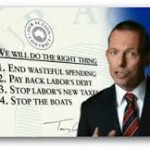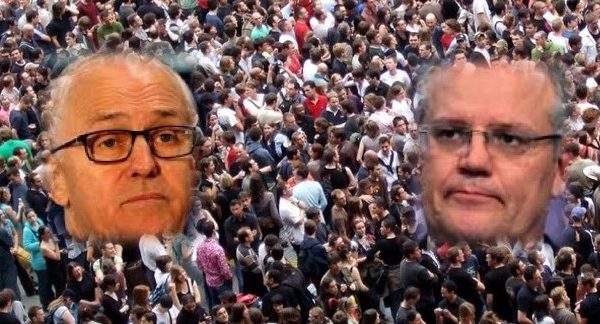 Prime Minister Tony Abbott’s changed approach to working with media once in government (most controversially with boat people) is a great case study for Crisis PR practitioners.
Prime Minister Tony Abbott’s changed approach to working with media once in government (most controversially with boat people) is a great case study for Crisis PR practitioners.
In opposition, Abbott wanted a crisis every day, and he developed a great skill at creating that, generating a media frenzy and public anxiety often on quite small issues. He did this mostly by picking the issue of the day and developing a clever one-liner. Tony’s one-liners became a bit of a feature of the nightly news and he created mayhem for the government.
When he was in government, Abbott wanted no crises, and lots of clear air so that he could get on with the task of governing. In this case, the defensive Crisis PR maxim often used in the corporate world, ‘no media is good media’, applies. Crises generate negative media, and our task as practitioners is to move quickly from a Crisis to Recovery. This involves minimising media activity asap.
So in the transition from opposition to government, Abbott had to move from creating a sense of crisis (lots of media creating public anxiety) to recovery (minimal media and reduced public concern) on issues like the deficit, people smuggling and the carbon tax.
Abbott’s apparent strategy with people smugglers is instructive. Once in government he moved quickly to holding press briefings once a week.
Crisis PR: What do we gain and what do we lose?
We lost open government: the strategy generated a lot of criticism within the media, deprived because ‘the public’s right to information’ is a fundamental principle of journalism (defined in the Journalists’ Code of Ethics).
However, there were multiple stakeholders, and in relation to the boat-people, communicating with the public was well down the list of  priorities. Possibly more important to Abbott were the messages being communicated to refugees prepared to risk the trip, with the government needing to deliver a very clear message that it is life threatening and the destination is more likely PNG than Australia. Also more important is a reassuring message to the Indonesians about our respect for their sovereignty, and the need for their support. In fact, the constant Australian frenetic media activity under Labor sent the wrong message to both stakeholders.
priorities. Possibly more important to Abbott were the messages being communicated to refugees prepared to risk the trip, with the government needing to deliver a very clear message that it is life threatening and the destination is more likely PNG than Australia. Also more important is a reassuring message to the Indonesians about our respect for their sovereignty, and the need for their support. In fact, the constant Australian frenetic media activity under Labor sent the wrong message to both stakeholders.
(We don’t want to confuse reduced media activity with then Minister for Immigration, Scott Morrison’s evasive press conferences – different issue. There is clumsy evasiveness and clever evasiveness (the media trainers call it ‘bridging’) – Morrison’s is clumsy, and alienating, and we think he’ll learn soon enough.)
The Labor government took a different approach to Abbott’s, which probably partly explains the constant crises for both the Rudd and Gillard governments. This is how a Rudd minder was quoted in The Australian Magazine in November 2009: “The modern news cycle feeds on disputes and inconsistencies, so you either feed the beast with the opposition or the beast feeds on you….”. “So we are very focused on maintaining discipline and consistency, but that’s not a reflection on our governing style, it’s a reflection of the modern media cycle. Ignore that at your peril.”
Two conflicting strategies with very different outcomes: ‘we have win the news cycle’ compared to ‘no media is good media’. The former feeds a crisis, the latter is used to recover from one.
(Peter Wilkinson is not affiliated in any way with any political party.)





